January 15, 2013
Edited by David Sanders
Specimen Days
January 15, 2013
1803 – Marjory Fleming, Scottish writer and poet (d. 1811), is born.
1850 – Mihail Eminesco, [Eminovici], Romanian poet (Samanul Dionis), is born.
1891 – Osip Mandelstam, Warsaw Poland, Russian poet (Noise of Time), is born.
1897 – Xu Zhimo, Chinese poet (d. 1931), is born.
1923 – Ivor Cutler, Scottish poet (d. 2006), is born.
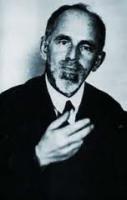 “Today makes no sense to me”
“Today makes no sense to me”
Today makes no sense to me,
yellow-mouthed it exists—
dockyard gates stare at me
through anchors and mist.
Slow, slow, in faded channels,
a battle-convoy slides by,
while narrow pencil-box canals
show blacker under sheets of ice.
—Osip Mandelstam (1891–1938)
Poetry In The News
Prisoners in New England Are Finding their Voice by Posting their Poetry Online
Prisoners have long written poetry from inside the prison walls. For incarcerated men and women—as for all who have the urge to write poetry—Robert Frost’s words ring true: the poem “begins as a lump in the throat, a sense of wrong, a homesickness, a lovesickness.” Poetry is the need to express what’s locked up inside, and for the prisoner, the bars are real. Sending a poem into the blogosphere is, however, a relatively new way for prisoners to find their voice. Boston University’s Robert Pinsky, a former U.S. Poet Laureate, says in an interview on Big Think that prisoners serving a life sentence often write the best poetry since they have a lot of time to reflect and read. Read more at the Boston Magazine.
Richard Blanco will be Poet for Obama’s Second Inauguration
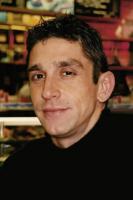
Richard Blanco, a Cuban American poet whose work has explored his immigrant roots and homosexual awakening, will deliver the poem at President Obama’s inauguration this month, the Presidential Inaugural Committee announced Wednesday. Blanco, 44, will become the youngest poet and the first Hispanic to recite a poem at the swearing-in ceremony, the committee said. Read more at the Washington Post.
Harvey Shapiro: The Poet Behind MLK’s “Letter from Birmingham Jail”
Poet and editor Harvey Shapiro was precisely the sort of offbeat genius who, a half-century or so ago, made Greenwich Village the capital of hipness. After serving as a tailgunner on a B-17 crew in World War II, he landed in lower Manhattan, where he lived on the same street as e.e. cummings and hung out at the old Lion’s Head tavern, where Norman Mailer once held court. He patronized Maurice, the beret-wearing butcher at Jefferson Market, and awoke on Sunday mornings “to love calls between the women inside the House of Detention on Tenth Street and the pimps and lovers on the outside.” Read more at AARP.
Teenage Immigrants Tell Their Stories Through Poetry
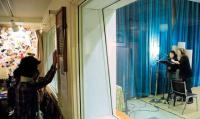
The Tukwila School District is the most diverse school district in the United States and Foster High School is a prime example of that. The school’s ESL classes are full of teenage immigrants from dozens of countries, representing even more cultures and languages. School is a struggle for many of these students, who are still learning English, and they don’t often get an opportunity to be creative or share their colorful stories. But in Carrie Stradley’s ESL class they do. Read more at My Northwest.
World Poetry
Faber Voices Offers Poetry E-books with Audio
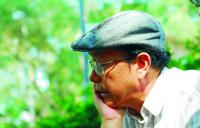
Leung Ping-kwan, who had been fighting lung cancer, died on Saturday. He was 63. Leung Ping-kwan, the poet and intellectual who celebrated and defined Hong Kong, had just been released from the hospital and sat, surrounded by spilling boxes of books, his trademark flat cap on his head, in his home in Hong Kong’s Causeway Bay district the last time I saw him, on Dec. 9. Read more at the New York Times.
New Books
Astonishment by Anne Stevenson
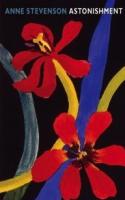
[Paperback] Bloodaxe Books Ltd, 64 pp., $21.95
Anne Stevenson’s 16th collection of poems looks back over eighty years of the earth’s never-ceasing turbulence, setting clearly remembered scenes from her personal past against a background of geographical and historical change. As always, her chief preoccupation is with the extraordinary nature of experience itself, and this she explores as a geologist might explore the rock layers beneath an urban surface relied upon by the senses, yet in the perspective of deep time acknowledged to be temporary and passing.
First Person Sorrowful by Ko Un
[Paperback] Bloodaxe Books Ltd, 160 pp., $23.95
For this collection, his translators have selected a hundred or so poems from the five collections published since the year 2002, collections acclaimed by Korean critics as bringing poetry to a new level of cosmic reference. Nothing shows more clearly his stature as a writer than the variety of themes and emotions found in his most recent work. Readers here have access for the first time to many of the poems Ko Un has produced in the 21st century, as he approaches his eightieth year, his energy and originality unabated.
School of the Americas by David Rigsbee
[Paperback] Black Lawrence Press, 70 pp., $14.00
David Rigsbee’s new poems turn to recent history refracted through an art as schooled by trauma, as the beauties his poems also celebrate, from the edge of tragedy to moments too human in their epiphanies to be swallowed by oblivion.
Collected Poems by Joseph Ceravolo
[Hardcover]Wesleyan, 500 pp., $35.00
Collected Poems offers the first full portrait of Joseph Ceravolo’s aesthetic trajectory, bringing to light the highly original voice that was operating at an increasing remove from the currents of the time. From a poetics associated with Frank O’Hara and John Ashbery to an ever more contemplative, deeply visionary poetics similar in sensibility to Zen and Dante, William Blake and St. John of the Cross, this collection shows how Ceravolo’s poetry takes on a direct, quiet lyricism: intensely dedicated to the natural and spiritual life of the individual.
A Raft of Grief: Poems by Chelsea Rathburn
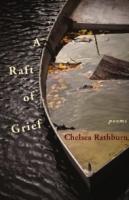
[Paperback] Autumn House Press, 88 pp., $17.95
“In her excellent A Raft of Grief, Chelsea Rathburn probes the varieties and nuances of love and relationships with unsparing lucidity. . . . I love how she is able to affirm what can happen between two people, while asking if a story-teller sometimes has to ‘sacrifice lovers and selves to the narrative arc?’ She is willing to, which is one reason why her narratives are so persuasive her allegiance throughout is to the poem as a whole. She will not let her fine moments overwhelm, as lesser poets often do; her limpid, yet complicated phrasing is always part of the poem’s fabric.” —Stephen Dunn
Recent Reviews
Priests of the Invisible

“Madness, Rack, and Honey,” by Mary Ruefle
by David Kirby
Last summer and fall, the Museum of Modern Art displayed a work called “Tapestry of the Thousand Longest Rivers in the World.” A witty, complex piece by an Italian artist named Alighiero e Boetti, it deserved the long look that museumgoers gave it. But visitors who saw the work during a previous exhibition, in 2008, were at least as tickled by the text of an accompanying plaque: “In 1968 Alighiero Boetti changed his name by inserting an ‘e’ (‘and’ in Italian) between his first and last names to indicate that he (and by extension, anyone) was not a single but a multiple self.” Read more at the New York Times.
Quick Question Is Classic John Ashbery
by Michael Robbins
It is happening again. Into the mawkish nature documentaries and faddish elliptical doldrums of American poetry, John Ashbery is sticking his clown nose. For nearly a half-century Ashbery has been popping up every two or three years to remind poetry readers what the pure product sounds like. The last surviving member of the so-called New York School — really just a loose affiliation of friends; the others were Frank O’Hara, Kenneth Koch, James Schuyler and Barbara Guest — the 85-year-old Ashbery has published at least 23 volumes of verse. Somewhere along the way, he became one of the most respected poets in the world. Read more at the Chicago Tribune.
Correspondences
The Flirtation of the Natural World: D. A. Powell
by John Deming
D.A. Powell and I had dinner together in a Chicago seafood restaurant on Leap Day, 2012. He ordered sushi, and I ordered spicy shrimp, and we discussed a variety of topics with a special focus on poetry, music, and mortality. Our interview was recorded, transcribed, and then co-edited. Powell’s fifth book of poems, Useless Landscape or A Guide for Boys, was published by Graywolf Press in 2012. Read more at Coldfront.
“Accessing a Limitless Vein of Words”: An Interview with Jeongrye Choi

by Ruth Williams
In her essay, “My Language and Its Moments,” which concludes Instances (Parlor Press, 2011), South Korean poet Jeongrye Choi explains that her writing proceeds from a deep sense of responsibility: “Someone gave me life and I should answer. Now that I am alive and have a memory and can feel things deeply, I have to answer the questions of who I am, and where I am. So I write.” . . . . I had the pleasure of meeting Jeongrye in Seoul. Not only did she kindly give me some delicious homemade kimchi and pickled sesame leaves, she also warmly agreed to discuss her work, the translation process, and Korean poetry. Read more at Montevidayo.
Inside a Greek Poet’s Work, a Reflection of Her Country’s Hard Times

by Angelos Tzortzinis
Kiki Dimoula, Greece’s feisty, 81-year-old national poet, was holding court on a recent afternoon, musing about her work and the fate of her country. Asked to describe the mood in Greece today, she did not mince words. “Darkness and chaos,” she said, drawing on a cigarette. Ms. Dimoula may have a flair for the dramatic, but her words are always chosen carefully. Her poetry — spare, profound, unsentimental, effortlessly transforming the quotidian into the metaphysical, drawing on the powerful themes of time, fate and destiny, yet making them entirely her own — has earned her a near-cult following in Greece. Read more at the New York Times.
Broadsides
Tea with the Pushkins in Brussels
by Michael Johnson
Sitting down with Alexander Pushkin for tea, as I did recently, is probably as close as I will ever come to communing with a supreme creative mind of the past. This Pushkin is the great-grandson of Russia’s national poet and a man determined to keep the poet’s oeuvre alive in the West. We sipped his own personal blend of chai from flowered ceramic demi-tasse cups (I was secretly disappointed not to be offered Russian-style tea glasses) and I wondered if habits like this were signs that he has turned into an ordinary Belgian. Read more at Open Letters Monthly.
Bitter Truths*
by John Minahane
The poets I intend to write about here are members of a special generation. They are old enough to have experienced life in the late years of communist Czechoslovakia, but their poetry was published only after Czechoslovakia’s change of regime (1989) and Slovakia’s independence (1993). They are a new breed, and self-consciously so. All of them are marked by West European and American literary and cultural influences, but without being overwhelmed. To my mind, anyhow, their poetry doesn’t begin and end with imitative attitudes and poses: there are signs of original encounters with their time, place and circumstances, which make this Slovak generation uncommonly interesting. Read more at the Dublin Review of Books.
Georgic for the World-System
by Joshua Clover
In his most lyrical moment, the young Marx wrote to his friend Ruge, “when everything is at an end, give me your hand, so that we may begin again from the beginning. Let the dead bury their dead and mourn them. On the other hand, it is enviable to be the first to enter the new life alive; that is to be our lot.” So I will begin again from the beginning, or at least very long ago, more than twenty centuries ago, with Virgil, who was born the year after the crushing of the Spartacus slave revolt. Read more at Lana Turner.
Stanford Scholar Roland Greene Holds Up Poetry as Cultural Mirror
by Corrie Goldman
Roland Greene, professor of English and of comparative literature, corresponded with nearly 500 contributors as editor in chief of a reference book on poetry and poetics. It took Stanford English and comparative literature Professor Roland Greene six years to complete a tour of the world. During the course of his travels – albeit mostly by correspondence – he surveyed the state of poetry in almost every nook and cranny of the globe. Along the way, Greene discovered some surprising trends about how we learn, our identities and how technology is altering our artistic boundaries. Read more at Stanford News.
Drafts & Fragments
George The Poet

is an up and coming act from North-West London. At twenty-one years of age he offers politically conscious and often humorous social commentary through poetry. This draws from his life in London’s inner-city as well as the Politics, Psychology and Sociology course he studies at Cambridge University. George champions a new brand of poetry which is set for commercial and critical success.
Bonhams to Sell Last Keats Handrwritten Poem in Finest Ever Poetry Sale
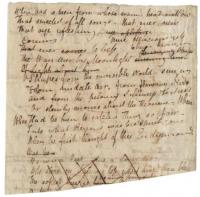
The last known handwritten poem by John Keats in private hands is one of the star items in the sale of the Roy Davids Collection III: Poetry: Poetical Manuscripts and Portraits of Poets which will be held in two parts on 10th April and 8 May 2013 at Bonhams, 101 New Bond Street. The sale is the fruit of 40 years of collecting by the poet and scholar Roy Davids and is the finest collection of poetry ever to come to auction. In Mr David’s own words, “it would now be impossible for the present collection to be even approximately replicated.’ The Keats manuscript is from the draft of his well known early poem, ‘I stood tiptoe on a little hill,’ and consists of 33 lines from the work scribbled on both front and back showing how the poet revised his thoughts as he wrote. This is the only poetical manuscript by Keats now ever likely to be available to collectors and it is estimated at £40,000-45,000.
Envoi: Editor’s Notes
Advice from Wislawa Szymborska
“Rilke warned young poets against large sweeping topics, since those are the most difficult and demand great artistic maturity. He counseled them to write about what they see around them, how they live each day, what’s been lost, what’s been found. He encouraged them to bring the things that surround us into their art, images from dreams, remembered objects. ‘If daily life seems impoverished to you,’ he wrote, ‘don’t blame life. You yourself are to blame. You’re just not enough of a poet to perceive its wealth.’ This advice may seem mundane and dim-witted to you. This is why we called to our defense one of the most esoteric poets in world literature—and just see how he praised so-called ordinary things!”
Yes, ma’am!
—David Sanders